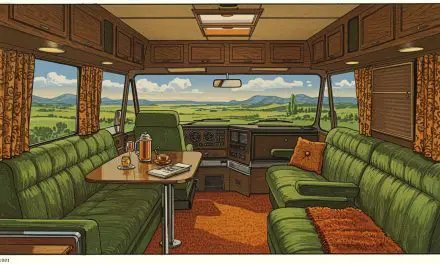RV trips create lasting memories that go beyond just physical souvenirs. Many travelers find themselves coming home with too many trinkets that end up collecting dust. Instead of filling your RV with more stuff, focus on collecting meaningful experiences and finding creative ways to preserve those special moments.
There are several simple methods to document your adventures without adding clutter to your already limited RV space. From journaling about daily discoveries to creating digital photo collections organized by location, these memory-keeping strategies help travelers revisit their favorite journeys anytime.
The best souvenirs aren’t things you can buy in gift shops – they’re the stories, photographs, and experiences that stay with you long after the journey ends. By being intentional about how you record your travels, RV enthusiasts can build a meaningful collection of memories that brings joy for years to come.
Embracing a Mindset of Collecting Memories
Would you like to save this article?
Shifting from a thing-centered to a memory-centered approach transforms the RV journey experience. This change in perspective helps travelers focus on what truly matters during their adventures.
The Difference Between Souvenirs and Experiences
Physical souvenirs often collect dust and take up valuable space in an RV. While they might trigger memories, they don’t actually contain the full emotional experience of a moment.
Experiences, on the other hand, become part of who we are. That sunset at the Grand Canyon, the spontaneous conversation with a fellow traveler in Yellowstone, or the family cookout under the stars in Moab—these moments shape us.
Memory-Collecting Tips:
- Take photos that capture feelings, not just landmarks
- Keep a travel journal with specific sensory details
- Record short voice memos about how you felt in special moments
- Create digital collections instead of physical ones
Letting Go of Material Possessions
RV life naturally encourages minimalism due to limited space. This constraint becomes a blessing when travelers embrace it as an opportunity to prioritize experiences.
Many long-term RVers report feeling liberated when they downsize their belongings. Without the burden of maintaining and organizing many possessions, they have more time and mental space for adventures.
The process often begins before hitting the road. Sorting through belongings and asking “Will this enhance my journey?” helps develop a memory-focused mindset.
Living with less in an RV teaches the difference between wants and needs. This perspective shift often remains even when travelers return to stationary life.
Benefits of a Memory-Focused RV Journey
Research shows experiences bring more lasting happiness than material things. Memory-rich journeys provide several key benefits:
Mental Benefits:
- Reduced stress from owning fewer things
- Greater appreciation for simple pleasures
- More mindful presence in daily activities
Practical Benefits:
- Lower expenses (spending on experiences, not stuff)
- Less cleaning and organizing time
- Easier movement between destinations
Memory-centered travel creates deeper connections with travel companions. Shared experiences form stronger bonds than shared possessions ever could.
The stories gathered become treasures to share for years to come, inspiring others and keeping the journey alive long after returning home.
Planning RV Trips for Meaningful Experiences
Great RV trips happen when you focus on creating memorable experiences rather than just covering miles. Thoughtful planning can transform an ordinary road trip into a journey filled with meaningful connections and unique adventures.
Choosing Destinations with Unique Activities
When selecting destinations, look beyond popular tourist spots. Research areas that offer activities aligned with your interests and values. National parks provide ranger-led programs that teach about local ecosystems and history. Small towns often host festivals celebrating their unique heritage.
Consider destinations that offer:
- Hands-on workshops (cheese-making, pottery, local crafts)
- Wildlife viewing opportunities (bird sanctuaries, marine life centers)
- Historical reenactments or living history museums
- Farmers markets where you can meet local producers
- Cultural events that showcase regional traditions
These experiences create stronger memories than simply viewing attractions from a distance. They engage multiple senses and often involve meeting locals who share their passion and knowledge.
Building Flexibility Into Your Itinerary
Avoid overscheduling your RV journey. A packed itinerary creates stress and prevents spontaneous discoveries that often become favorite memories.
Allow 1-2 unplanned days for every 5 days of travel. This buffer accommodates weather changes, unexpected roadside attractions, or chance encounters with other travelers.
Consider using the “3-2-1” approach:
- 3 days minimum at key destinations
- 2 activities maximum planned per day
- 1 day completely unscheduled each week
Keep meal plans simple on travel days. Pack easy lunches to enjoy at scenic overlooks rather than rushing to reach a restaurant by a certain time.
Seeking Out Hidden Gems
Some of the most meaningful RV experiences happen off the beaten path. Research local attractions beyond what appears in standard travel guides.
Talk to locals for recommendations:
- Campground hosts often know about nearby hidden spots
- Visitor center staff can suggest less-crowded alternatives
- Local coffee shops and bookstores are great for conversation
- Online forums for RVers might mention special places
Use apps like iOverlander or Hipcamp to find unique camping opportunities on farms, vineyards, or private lands. These often include interactions with property owners and a glimpse into local life.
State and county parks frequently offer more authentic experiences than crowded national parks, with similar natural beauty and fewer restrictions.
Involving Everyone in the Planning
When traveling with family or friends, include everyone in trip planning. This creates shared ownership of the experience and ensures activities match everyone’s interests.
Hold a pre-trip meeting where each person shares:
- One must-see destination
- One activity they’re excited about
- One food experience they want to have
For families with children, assign age-appropriate research tasks. Kids can investigate junior ranger programs, local wildlife, or historical facts about destinations.
Create a shared digital folder or physical binder where everyone adds ideas. This becomes both a planning tool and eventually a keepsake of anticipation.
Immersing Yourself in Local Culture
One of the greatest joys of RV travel is experiencing different ways of life across the country. True immersion goes beyond typical tourist spots and creates lasting memories that connect you with the places you visit.
Participating in Community Events
Local festivals, farmer’s markets, and town celebrations offer perfect opportunities to experience authentic culture. Check community bulletin boards, local newspapers, or visitor centers when you arrive at a new destination to find upcoming events.
Small town parades, county fairs, and seasonal celebrations often showcase traditions unique to that region. These gatherings typically welcome visitors and provide a genuine glimpse into local life.
Many RV parks also host their own activities like potlucks or game nights. These casual gatherings can be great starting points for meeting locals and other travelers who might share tips about the area.
Connecting With Locals
Strike up conversations with people at local businesses rather than chain stores. Coffee shops, family-owned restaurants, and small boutiques often have staff who enjoy sharing information about their hometown.
Simple ways to meet locals:
- Take walking tours led by residents
- Visit local museums with volunteer docents
- Shop at neighborhood farmers’ markets
- Attend community classes or workshops
Learning just a few phrases in the local dialect or regional slang can help break the ice. People appreciate when visitors show interest in their community’s unique expressions.
Trying Regional Food and Traditions
Food tells the story of a place’s history, geography, and values. Seek out family-owned restaurants serving local specialties instead of familiar chain restaurants.
Visit local grocery stores and farmers’ markets to discover ingredients unique to the region. Many areas have specialty food items they’re known for—Wisconsin cheese, Maine lobster, New Mexico chile.
Beyond eating, try participating in local traditions. This might mean learning traditional crafts, attending cultural demonstrations, or joining in seasonal activities like apple picking in New England or attending a rodeo in Texas.
Cooking regional dishes in your RV kitchen creates lasting memories and skills you can take home. Many locals are happy to share family recipes when they see genuine interest in their food traditions.
Capturing Moments Without Overdoing It
Recording your RV adventures doesn’t require filling your limited space with souvenirs. The key is being selective and intentional about how you preserve memories.
Snapping Photos Intentionally
Taking photos is the most common way travelers document their journeys, but quality beats quantity. Instead of snapping hundreds of random shots, focus on meaningful moments that tell a story.
Try the “three photo rule” at each location: capture the landscape, a detail that caught your eye, and people enjoying the moment. This creates a more complete memory while keeping your photo library manageable.
Consider setting aside time each week to organize and delete unnecessary photos. Many RVers create digital albums by location or date, making it easier to find and share memories later.
Add captions to your favorite photos right on your phone. This simple step adds context that might be forgotten years later.
Journaling and Storytelling
A small travel journal takes up minimal space but holds countless memories. Even writing just 3-5 sentences each day can capture the essence of your journey.
Try different journaling styles to find what works best:
- Bullet journaling: Quick notes about places, people, and feelings
- Sketch journaling: Simple drawings with brief descriptions
- Prompt journaling: Answer the same few questions each day (“Best thing I saw today was…”)
Many RVers establish a nightly routine of journaling with their evening tea or coffee. This consistency helps make it a habit rather than a chore.
Voice-to-text apps can capture your thoughts when you don’t feel like writing. Just speak your memories and save them for later.
Creating Videos and Audio Diaries
Short video clips often capture the feeling of a place better than photos alone. The sounds, movements, and voices create a more immersive memory.
Create 60-second highlight videos of each location instead of recording hours of footage. This makes them more watchable and shareable with friends and family.
Audio diaries work well for many travelers. Record your thoughts while driving to the next destination or before bed. These recordings capture your authentic reactions and excitement.
Try interviewing fellow travelers or locals you meet. Their perspectives and stories add depth to your memory collection and help you remember conversations that might otherwise be forgotten.
Making Memories as a Group
RV travel creates perfect opportunities for shared experiences with family and friends. The confined spaces and new environments naturally foster togetherness in ways that traditional vacations often miss.
Collaborative Activities for Families and Friends
Outdoor Movie Nights can transform any campsite into a special experience. Hang a white sheet between trees, set up a portable projector, and spread out blankets and camping chairs. Don’t forget the popcorn and hot chocolate!
Themed Dinner Nights build anticipation and creativity. Assign each person or family a night to prepare a meal representing a region you’re visiting. Take photos of each chef with their creation.
Group Hikes with Purpose make trails more meaningful. Create a scavenger hunt list before hitting the trail, or challenge everyone to find something that starts with each letter of the alphabet.
Campfire Storytelling becomes magical when everyone participates. Try progressive stories where each person adds a few sentences, or have “memory circles” where everyone shares their favorite moment from the day.
Celebrating Milestones on the Road
Birthday Celebrations gain special meaning on the road. Decorate the campsite with items from local shops and plan an activity the birthday person has always wanted to try.
Travel Anniversaries mark important points in your journey. Create small traditions for when you cross state lines or reach landmarks—like taking a group jump photo at each national park entrance.
Achievement Recognition builds group pride. Celebrate when someone conquers a fear, masters backing up the RV, or handles a difficult trail. Create homemade certificates or small tokens from natural materials found along your route.
Bonding Through Challenges
Weather Events often become favorite memories. Instead of complaining about rain, organize indoor tournaments, storytelling marathons, or craft sessions using materials you’ve collected.
Mechanical Issues can actually strengthen relationships. Assign everyone a role during repairs or maintenance—even if it’s just holding a flashlight or reading instructions.
Navigation Mistakes regularly turn into adventures. When you take a wrong turn, make it a policy to find at least one interesting stop or photo opportunity before getting back on track.
Group Problem-Solving builds teamwork. From figuring out how to fit everyone’s gear to managing limited water resources, celebrate your collective ingenuity rather than focusing on the inconvenience.
Preserving and Sharing Your Adventures
Collecting memories during RV travels is just the beginning. The real magic happens when you organize and share those special moments in ways that let you relive your adventures for years to come.
Organizing Digital Photos
Digital photos can quickly become overwhelming without a good system. Create folders on your computer or cloud storage organized by trip dates or locations. Consider using simple photo management apps like Google Photos or Apple Photos that automatically sort pictures by date and location.
Give your photo collections descriptive names like “Grand Canyon Sunset 2025” instead of just “IMG_2546.” This makes finding specific memories much easier later.
Take time every few weeks to delete duplicate or blurry photos. Keep only the best shots that truly capture the feeling of a place or moment.
Back up your photos in at least two places—perhaps a hard drive and a cloud service. This protects your precious memories from being lost if one storage method fails.
Designing Custom Travel Maps
Maps tell the story of your journey in a visual way that words and photos sometimes can’t. Use free online tools like Google My Maps to create personalized maps of your RV adventures.
Drop pins on all the places you’ve visited and color-code them by year or type of experience. Add notes, photos, and even short stories to each pin.
Fun Map Ideas:
- Create a “Best Campgrounds” map with ratings
- Make a “Hidden Gems” map of unexpected discoveries
- Design a “Bucket List” map of places you still want to visit
Physical maps work great too! Hang a large U.S. map in your RV and use colorful pins or markers to track your routes.
Putting Together Scrapbooks or Memory Boxes
Physical mementos bring a special touch to your travel memories. Start a simple scrapbook with acid-free pages that won’t damage your photos and keepsakes over time.
Include more than just photos—ticket stubs, pressed wildflowers, local newspaper clippings, and campground maps all tell part of your story. Write short captions with dates and funny moments you don’t want to forget.
For those who prefer less crafting, memory boxes work great. Label small boxes by trip or year and fill them with collected items.
Keep a small journal during your travels with quick notes about daily activities, weather, and people you met. These details often fade from memory but make your scrapbooks richer when you add them later.
Living in the Moment While on the Road
RV travel offers a unique chance to disconnect from daily life and truly experience each destination. The journey becomes more meaningful when travelers stay present and engage with their surroundings.
Unplugging From Devices
One of the biggest challenges for modern travelers is setting boundaries with technology. While smartphones and tablets are useful for navigation and emergency contact, they can distract from real experiences.
Try setting specific “device-free” times during your journey. Maybe the hours between 10 AM and 2 PM become a no-phone zone, allowing everyone to focus on the landscape passing by.
Many RV parks now have designated “digital detox” areas where connectivity is limited by design. These spaces encourage travelers to read physical books, play board games, or simply talk to one another.
Consider keeping a small basket near the RV door where everyone deposits their devices during meals or special activities. This simple habit can transform how families interact on the road.
Practicing Mindfulness During Your Journey
Mindfulness means paying attention to the present moment without judgment. For RV travelers, this might involve taking five minutes each morning to appreciate the new view outside your door.
Use your senses intentionally:
- Look at the changing landscapes and notice small details
- Listen to local birds or the sound of leaves rustling
- Smell regional plants or foods cooking at nearby campsites
- Touch interesting rocks, tree bark, or water from different regions
When pulling into a new location, take a brief walking tour without your camera first. This helps you experience the place directly before capturing images.
Simple breathing exercises can help reset your mind when travel stress builds. Try counting to four as you inhale and eight as you exhale.
Reflecting at Day’s End
Evening reflection creates lasting memories. Keep a small travel journal by your bed to jot down three interesting things you noticed that day.
Ask meaningful questions around the campfire:
- What surprised you today?
- What made you smile?
- What would you like to learn more about?
Take turns sharing “high points” and “learning moments” from each day’s adventures. This not only preserves memories but strengthens connections between travelers.
Photos are important, but consider organizing them within 24 hours while experiences are fresh. Delete duplicates and keep only images that truly capture the feeling of a place.
Some RV travelers find voice recording easier than writing. A simple 60-second audio journal each night can become a treasure when reviewed later.
Staying Inspired for Future Memory-Making
Even the best RV trips eventually end, but the inspiration from each adventure can fuel your next journey. Keeping track of what worked well and collecting fresh ideas helps turn each trip into a stepping stone for future memories.
Documenting Lessons Learned
RV travelers should keep a “lessons learned” journal after each trip. This simple habit helps avoid repeating mistakes and builds on successes. Write down what worked well with your packing system and what didn’t.
Note which campgrounds had the best views or friendliest neighbors. Record how long certain drives actually took compared to what was planned.
Many RVers create a simple checklist system. They mark things like “bring extra propane next time” or “avoid this highway during rush hour.”
Some travelers use their phones to make quick voice notes during the trip. Later, they transfer these insights to a dedicated notebook or digital document for future reference.
Collecting Ideas for Next Time
Creating a “dream destinations” folder keeps the excitement alive between trips. Travelers can save articles, photos, or campground reviews that catch their eye.
Social media groups for RV enthusiasts offer endless inspiration. Follow hashtags like #RVlife or #RoadTrips to discover hidden gems other travelers have found.
Keep a map where you mark places you want to visit someday. This visual reminder helps with planning and builds anticipation.
Local tourism brochures often contain ideas that aren’t easily found online. Collect these during your travels for future reference.
Many RVers recommend setting up a simple spreadsheet or document with columns for the destination, best time to visit, and special features to check out.







